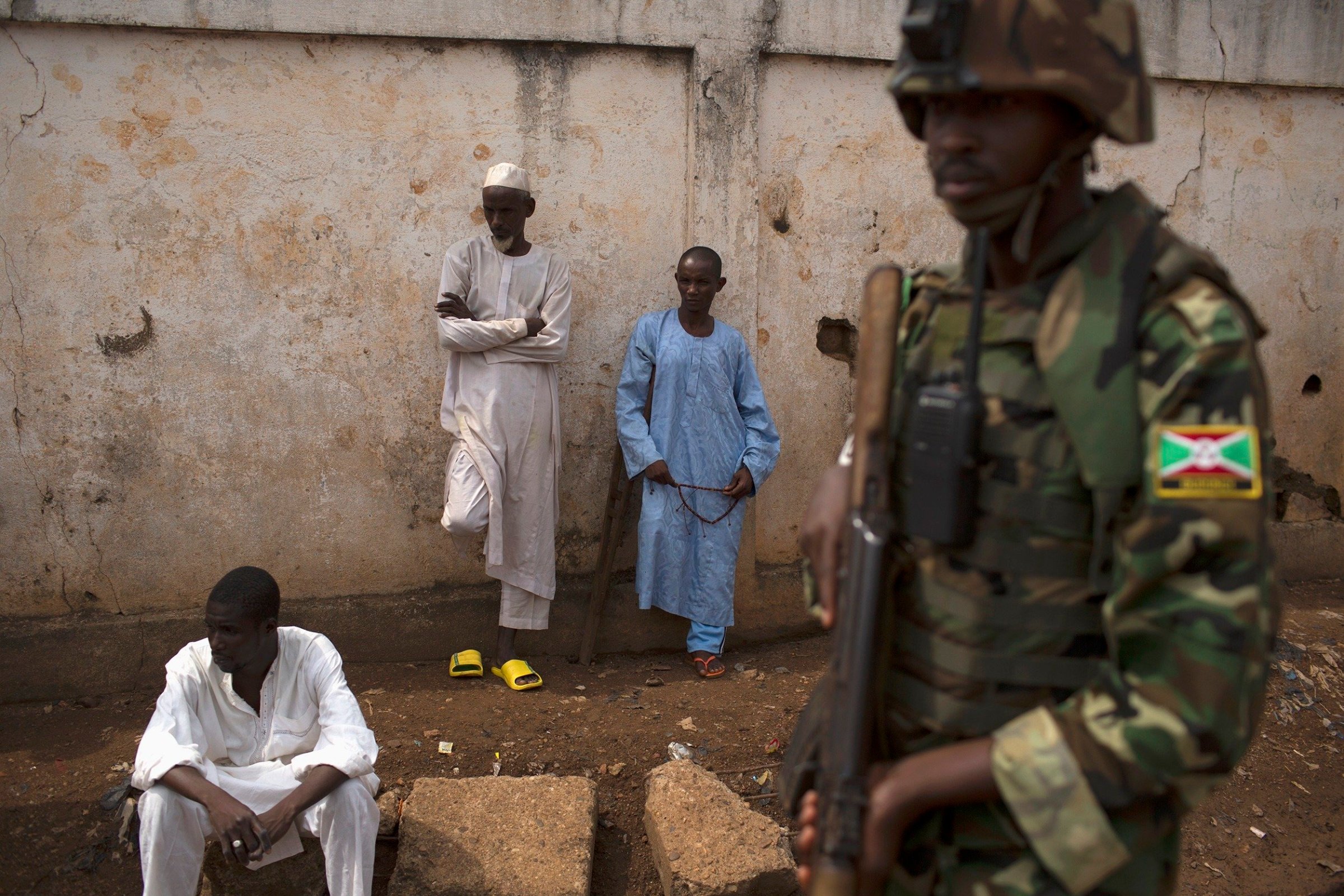
The Central African Republic marked a grim anniversary on March 24, one year after mostly Muslim rebels seized power and began a reign of terror that prompted largely Christian militias to respond with unprecedented fury. The newest clashes between militiamen and foreign peacekeepers in the capital, Bangui, left at least nine people dead and underscored how the chronically poor state, ravaged by corrupt governance and continually propped up by international aid, faces its steepest climb yet to stability.
Aid groups and experts estimate that untold thousands have been killed since Séléka rebels forced out President François Bozizé after his decade of rule. More than half of the country’s 4.6 million people are in need of basic aid and one-fourth have been forced to flee their homes. “This is the worst year in the country’s history,” said Joanne Mariner, a senior crisis advisor with Amnesty International who frequently documents abuses around the country. “It’s an unhappy anniversary.”
Séléka, with Chadian and Sudanese militants in its ranks, fed up with the government’s shunning of the historically marginalized Muslim minority, scrapped a truce. The installation of rebel commander Michel Djotodia as the first Muslim president became a free pass for Séléka to commit atrocities against the majority Christian population. Then, Christians and animists, including soldiers from the country’s disorganized armed forces, formed into armed groups called anti-balaka to fight back, leading to two days of December street warfare that killed about a thousand people.
That carnage made rare international headlines and prompted former colonial ruler France and the African Union to send in thousands of peacekeepers to protect civilians and begin restoring order. Séléka couldn’t match the foreigners’ firepower and began to retreat from Bangui. However, with troops focused on protecting Christians, anti-balaka filled the power void and began attacking Muslims in the capital and northwest. Three months of retaliatory looting and killing, a purge classified as “ethnic cleansing” by experts, has pushed an estimated 300,000 Muslims into neighboring countries. It also calls into question the efficacy of Catherine Samba-Panza, the mayor of Bangui promoted two months ago to Interim President, who pledged to end the violence.
Lewis Mudge, a Rwanda-based researcher with the Africa division of Human Rights Watch, just returned from a 10-day trip to the C.A.R.’s southwestern region. He called it “a lawless zone” where the anti-balaka confidently roam and where the last remaining Muslims in the country are trying to get out.
“They’re using artisanal, homemade shotguns,” he said of the Christian vigilantes, deemed “terrorists” this week by the African Union after they killed a Congolese peacekeeper. “They wound people with these guns and they finish them off with machetes. It’s pretty savage,” he told TIME, and others have stronger weaponry. “Anti-balaka groups feel that they have complete impunity on roads, and at often times they do. These killings are happening with nobody around to watch them and to witness them and to record them.”
In an interview with Deutsche Welle, Interim Prime Minister Andre Nzapayeke outlined the transitional government’s “two-pronged approach” to relieving chaos: dialogue with those responsible for the madness and the implementation of an effective and swift justice system. “We have to take concrete steps to arrest offenders, bring them to court and send them to jail,” he said. “It is only through the judiciary that we can restore the authority of the state in Central African Republic. It is the only way to restore confidence of the people in the state.”
How long it will take to embolden the crumbled political institutions is unclear. U.N. Secretary-General Ban Ki-moon has proposed sending in thousands more peacekeepers to aid the effort, but any force approved by the Security Council wouldn’t deploy before the end of summer. That bodes ill for a country that has driven out nearly all of its Muslims, the merchants and cattle herders responsible for its food production, ahead of the rainy season. “The worse the country gets,” said Mariner, “the more difficult it is going to be to put back together in any way.”
More Must-Reads from TIME
- Donald Trump Is TIME's 2024 Person of the Year
- Why We Chose Trump as Person of the Year
- Is Intermittent Fasting Good or Bad for You?
- The 100 Must-Read Books of 2024
- The 20 Best Christmas TV Episodes
- Column: If Optimism Feels Ridiculous Now, Try Hope
- The Future of Climate Action Is Trade Policy
- Merle Bombardieri Is Helping People Make the Baby Decision
Contact us at letters@time.com